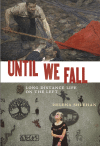
Until We Fall: Long Distance Life on the Left
Offers vivid first hand accounts of encounters with fellow socialists following the fall of the Soviet Union
Most westerners glimpsed the breakup of the Soviet Union at a great distance, through a highly distorted lens which equated the expansion of capitalism with the rise of global democracy. But there were those, like Helena Sheehan, who watched more keenly and saw a world turning upside down. In her new autobiographical history from below, Until We Fall, Sheehan shares what she witnessed first-hand and close-up, as hopes were raised by glasnost and perestroika, only to be swept away in the bitter and brutal counterrevolutions that followed.
In Until We

Radek: A Novel
Through this dramatic history by Stefan Heym, we become intimate with the story of the maverick and internationalist Karl Radek, known as the editor of the newspaper of record throughout the Soviet era, Isvestia. Beginning as Lenin’s companion at the dawning of the October Revolution, Radek later became Stalin’s favorite intellectual – only to find himself entangled in the great purges of the late 1930s and scripting his own trial. In this, his last historical novel, Heym reveals Radek as a brilliant Bolshevik journalist and politician who found himself at every turn of the wheel of fate. | more…

Searching for Alternatives in Eastern Europe
Tamás Krausz Interviewed by Róbert Nárai
In the 1960s, Georg Lukács—under the slogan Back to Marx!—called for a “renaissance” of Marxism within Eastern Europe. To understand the nature of this renaissance, we have to understand the many important questions that the Hungarian uprising of 1956 raised for the anti-Stalinist left inside Hungary and Eastern Europe more broadly. This interview looks at efforts to rethink the future of socialism from the Eastern European situation in the second half of the twentieth century, including the political lessons of 1968, the internal fight within the Hungarian Socialist Party, and the continued relevance of V. I. Lenin’s Marxism. | more…

A Socialist Defector: From Harvard to Karl-Marx-Allee
The circumstances that impelled Victor Grossman, a U.S. Army draftee stationed in Europe, to flee a military prison sentence were the icy pressures of the McCarthy Era. Grossman—a.k.a. Steve Wechsler, a committed leftist since his years at Harvard and, briefly, as a factory worker—left his barracks in Bavaria one August day in 1952, and, in a panic, swam across the Danube River from the Austrian U.S. Zone to the Soviet Zone. Fate—i.e., the Soviets—landed him in East Germany, officially the German Democratic Republic. There he remained, observer and participant, husband and father, as he watched the rise and successes, the travails, and the eventual demise of the GDR socialist experiment. | more…

As the World Turned Upside Down
Left Intellectuals in Yugoslavia, 1988–90
Throughout Eastern Europe, there was an unleashing of pent-up questions, hopes, and fears brewing for decades. There was a sense that the ground was trembling underneath these experiments in socialism. It was clear to most of us that socialism could only survive through radical democratization. | more…

Harbors Rich in Ships: The Selected Revolutionary Writings of Miroslav Krleža, Radical Luminary of Modern World Literature
Miroslav Krleža was a giant of Yugoslav literature, yet remarkably little of his writing has appeared in English. In a body of work that spans more than five dozen books, including novels, short stories, plays, poetry, and essays, Krleža steadfastly pursued a radical humanism and artistic integrity. Harbors Rich in Ships gives English-speaking readers an unprecedented opportunity to appreciate the astonishing breadth of Krleža’s literary creations. Beautifully translated by Željko Cipriš, this collection of seven representative early texts introduces a new audience to three stories from Krleža’s renowned antimilitarist book, The Croatian God Mars; an autobiographical sketch; a one-act play; a story from his collection of short stories, One Thousand and One Deaths; and his signature drama, The Glembays, a satirical account of the crime-ridden origins of one of Zageb’s most aristocratic families. | more…
Cluster Munitions and State Terrorism
For decades, major global and regional powers have waged war against those they accuse of fighting immorally—that is, those who use terrorism to harm civilians at home and abroad. Paradoxically, these righteous “wars on terror” are being fought in an era in which the distinction between war waged only against soldiers, and war against soldiers as well as civilians has virtually collapsed. The technological development, stemming from the Industrial Revolution, of aerial bombardment and weapons of mass destruction has made it more difficult to separate citizen from soldier.… [but] it is imperative that this distinction hold. In waging wars on terror, [upholding the soldier/citizen distinction] permits globally powerful nations to rally public opinion under the assertion that what separates us (self) from them (other) is that civilian life is paramount for us and not for “the terrorists.” | more…
Humanitarian Imperialism: The New Doctrine of Imperial Right
Jean Bricmont’s concept “humanitarian imperialism” succinctly captures a dilemma that has faced Western leaders and the Western intellectual community since the collapse of the Soviet Union. From the origins of the Cold War, there was a reflexive justification for every resort to force and terror, subversion and economic strangulation: the acts were undertaken in defense against what John F. Kennedy called “the monolithic and ruthless conspiracy” based in the Kremlin (or sometimes in Beijing), a force of unmitigated evil dedicated to extending its brutal sway over the entire world. The formula covered just about every imaginable case of intervention, no matter what the facts might be. But with the Soviet Union gone, either the policies would have to change, or new justifications would have to be devised. It became clear very quickly which course would be followed, casting new light on what had come before, and on the institutional basis of policy | more…
October 2007 (Volume 59, Number 5)
Notes from the Editors
It is almost unheard of for a whole issue of MR (other than occasionally one of our special July-August issues) to be devoted to a single contribution. The typical MR issue consists of a lot of short articles. We have no intention of changing that. Nevertheless, we are making a rare exception in the case of Edward S. Herman and David Peterson’s “The Dismantling of Yugoslavia,” which we regard as the definitive critique at this stage both of the U.S./NATO role in the exploitation and exacerbation of the Yugoslavian tragedy and of the “Western Liberal-Left Intellectual and Moral Collapse” that made this possible. So effective has been the media propaganda system at presenting the imperialist wars in Yugoslavia in the 1990s as “humanitarian interventions” that this not only bolstered support for the invasions and occupations in Afghanistan and Iraq (in defiance of international law), but is now being offered as a justification for further possible “humanitarian interventions” elsewhere, such as Iran, the Sudan (Darfur), Nigeria, and even Venezuela | more…
September 1999 (Volume 51, Number 4)
Notes from the Editors
We’ve received three letters from readers complaining about our articles on Kosovo. While this isn’t a groundswell of opinion, we assume that there are other readers out there who share the concerns of these critics, and since this is an important issue, we think it’s worth returning to it. We won’t go over the same ground again, but we want to take up at least one larger question raised by the critics | more…

Imperialism Without Colonies
In the decades after 1945, as colonial possessions became independent states, it was widely-believed that imperialism as a historical phenomenon was coming to an end. The six essays collected in this volume demonstrate that a new form of imperialism was, in fact, taking shape—an imperialism defined not by colonial rule but by the global capitalist market. From the outset, the dominant power in this imperialism without colonies was the United States. | more…